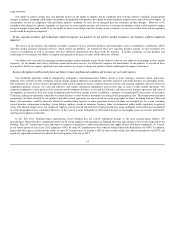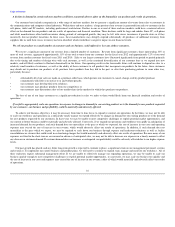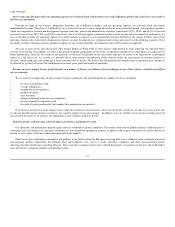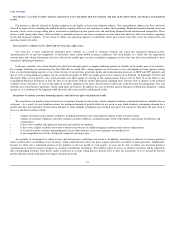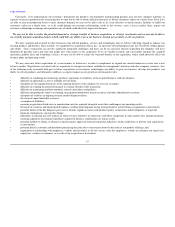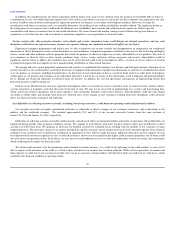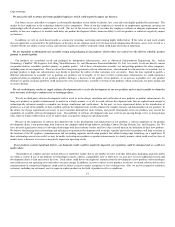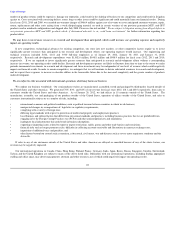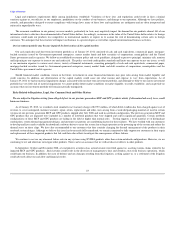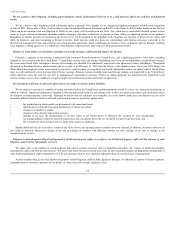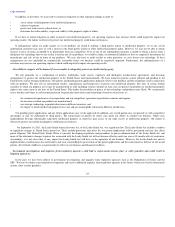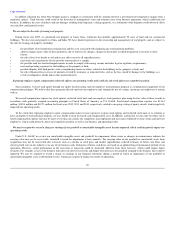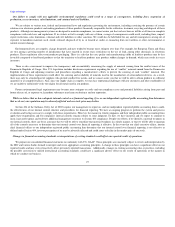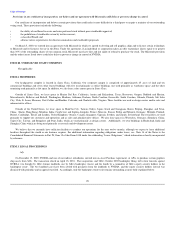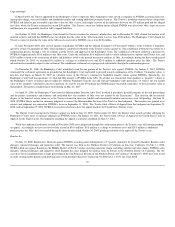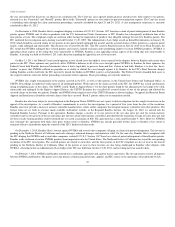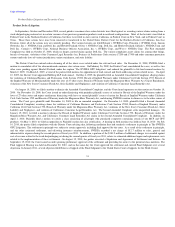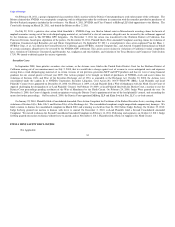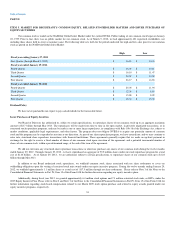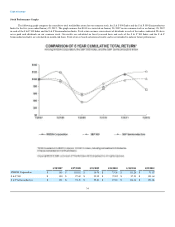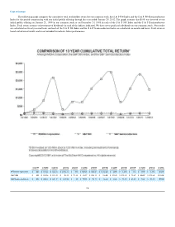NVIDIA 2012 Annual Report Download - page 26
Download and view the complete annual report
Please find page 26 of the 2012 NVIDIA annual report below. You can navigate through the pages in the report by either clicking on the pages listed below, or by using the keyword search tool below to find specific information within the annual report.
Table of Contents
In addition, in the future, we may need to commence litigation or other legal proceedings in order to:
• assert claims of infringement of our intellectual property;
• enforce our patents;
• protect our trade secrets or know-how; or
• determine the enforceability, scope and validity of the propriety rights of others.
If we have to initiate litigation in order to protect our intellectual property, our operating expenses may increase which could negatively impact our
operating results. Our failure to effectively protect our intellectual property could harm our business.
If infringement claims are made against us or our products are found to infringe a third parties' patent or intellectual property, we or one of our
indemnified customers may have to seek a license to the third parties' patent or other intellectual property rights. However, we may not be able to obtain
licenses at all or on terms acceptable to us particularly from our competitors. If we or one of our indemnified customers is unable to obtain a license from a
third party for technology that we use or that is used in one of our products, we could be subject to substantial liabilities or have to suspend or discontinue the
manufacture and sale of one or more of our products. We may also have to make royalty or other payments, or cross license our technology. If these
arrangements are not concluded on commercially reasonable terms, our business could be negatively impacted. Furthermore, the indemnification of a
customer may increase our operating expenses which could negatively impact our operating results.
Our ability to compete will be harmed if we are unable to adequately protect our intellectual property.
We rely primarily on a combination of patents, trademarks, trade secrets, employee and third-party nondisclosure agreements, and licensing
arrangements to protect our intellectual property in the United States and internationally. We have numerous patents issued, allowed and pending in the
United States and in foreign jurisdictions. Our patents and pending patent applications primarily relate to our products and the technology used in connection
with our products. We also rely on international treaties, organizations and foreign laws to protect our intellectual property. The laws of certain foreign
countries in which our products are or may be manufactured or sold, including various countries in Asia, may not protect our products or intellectual property
rights to the same extent as the laws of the United States. This makes the possibility of piracy of our technology and products more likely. We continuously
assess whether and where to seek formal protection for particular innovations and technologies based on such factors as:
• the commercial significance of our operations and our competitors' operations in particular countries and regions;
• the location in which our products are manufactured;
• our strategic technology or product directions in different countries; and
• the degree to which intellectual property laws exist and are meaningfully enforced in different jurisdictions.
Our pending patent applications and any future applications may not be approved. In addition, any issued patents may not provide us with competitive
advantages or may be challenged by third parties. The enforcement of patents by others may harm our ability to conduct our business. Others may
independently develop substantially equivalent intellectual property or otherwise gain access to our trade secrets or intellectual property. Our failure to
effectively protect our intellectual property could harm our business.
On September 16, 2011, the Leahy-Smith America Invents Act, or the Leahy-Smith Act, was signed into law. The Leahy-Smith Act includes a number
of significant changes to United States patent law. These include provisions that affect the way patent applications will be prosecuted and may also affect
patent litigation. The United States Patent Office is currently developing regulations and procedures to govern administration of the Leahy-Smith Act, and
many of the substantive changes to patent law associated with the Leahy-Smith Act will not become effective until one year or 18 months after its enactment.
Accordingly, it is not clear what, if any, impact the Leahy-Smith Act will have on the operation of our business. However, the Leahy-Smith Act and its
implementation could increase the uncertainties and costs surrounding the prosecution of our patent applications and the enforcement or defense of our issued
patents, all of which could have a material adverse effect on our business and financial condition.
Government investigations and inquiries from regulatory agencies could lead to enforcement actions, fines or other penalties and could result in
litigation against us.
In the past, we have been subject to government investigations and inquiries from regulatory agencies such as the Department of Justice and the
SEC. We may be subject to government investigations and receive additional inquiries from regulatory agencies in the future, which may lead to enforcement
actions, fines or other penalties.
25


